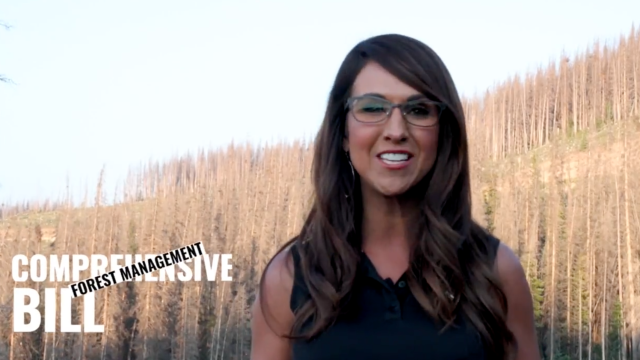Colorado Representative Lauren Boebert wants you to think she’s got the fix for wildfires.
On Thursday, Boebert rolled out a new ad claiming that “ecoterrorism” and “far-left lawsuits” have “shut down” forests, creating a “tinderbox” of dead trees. “We all want fewer fires, clearer skies, and land far less susceptible to flooding and mudslides,” she says in the ad, standing in front of a tree-filled landscape.
The solution that she touts is a forest management bill she introduced last summer, which focuses on mitigating the impacts of bark beetles, which have exploded across the West (thanks in part to warmer winters), and establishing forest thinning programs. Boebert seems to be leaning hard on positioning the legislation as “bipartisan” and based in “science,” with a staffer emphasising to Colorado Public Radio last summer that she’d modelled pieces of the bill off other legislation introduced by Democratic Colorado Sen. Michael Bennet. (In July, Bennet’s office told the Durango Herald that it was “still reviewing” the bill. We’ve reached out to Bennet’s office for an update and will include if they get back to us.) Colorado saw some devastating fires last year, including unprecedented and destructive December wildfires, as the West’s historic drought continued to ravage the state, so it seems natural that its politicians are working on solutions.
Whenever we’re talking about Boebert and environmental policy, it’s important to remember that she personally benefits from oil and gas industry profits. Last year, news broke that she had conveniently forgotten to report her husband’s income as an oil and gas consultant on her campaign disclosure forms when she was first running for the House in 2020. Boebert’s spouse, according to documents made public last year, earned $US478,000 ($663,560) in 2020 and $US460,000 ($638,572) in 2019 from an oil and gas operator. Nothing to see here, folks!
Let’s Save Our Forests! pic.twitter.com/mqeb06OmVR
— Rep. Lauren Boebert (@RepBoebert) February 17, 2022
This money might help explain why Boebert has been particularly eager over her short career to bang GOP climate-denial talking points. She’s joined in a false conservative pile-on claiming the Biden administration would require Americans to cut their red meat intake. She’s introduced legislation to prevent the U.S. from joining the Paris Agreement and legislation to block moratoriums on oil and gas leasing. And she’s become obsessed with the idea of “Green New Deal extremists” infiltrating the government, spending valuable time at a hearing on the Western drought crisis last May questioning one Interior Department employee’s ties to Michael Bloomberg. (At the time of the hearing, almost all of Boebert’s district was in a drought, so you think she’d have wanted to use the time she had to learn more about the science behind what’s going on.)
Using forest management as a cudgel to distract from climate change and pretend to put forward solutions isn’t exactly a new trick in the GOP playbook. (Remember how obsessed Trump was with “raking”?) Keeping forests healthy is absolutely a crucial part of helping to prevent wildfires from getting wildly out of control. But putting all the emphasis on our ability to stop runaway fires by fixing forests far oversimplifies the effects that climate change and the West’s extended drought are having on fire strength, duration, and timing.
Boebert’s bill is indicative of how the next generation of GOP leaders is shifting sneakily on climate as disasters increasingly mount in red states. Rather than double down on total denial, Boebert is placing herself as a solutions-first leader, proposing legislation that, at first glance, seems like it’s doing something to address the problem — but that conveniently does not engage at all with climate change, one of the root causes of deadly wildfires. It’s the same strategy that Florida Governor Ron DeSantis is employing with the sea level rise threatening his state: make sweeping and impressive commitments to help communities adapt, while never mentioning climate change at all and giving oil and gas the green light to keep thriving in Florida.
In any case, the bill hasn’t gone anywhere since being introduced in the House last summer and currently has no Democratic cosponsors.
Editor’s Note: Release dates within this article are based in the U.S., but will be updated with local Australian dates as soon as we know more.
